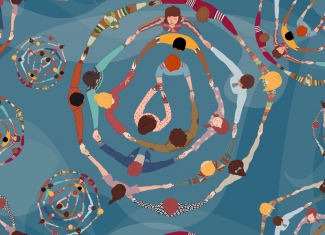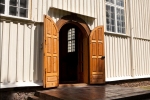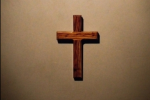May 2023
LGBTQ+ Pride
Gifts of Queerness
I’m a queer priest pastoring a community known for its conservatism. We’re in the process of organizing a Pride parade and festival, the second one of its kind in our town. The main organizer is a young queer man named Welyin who grew up in Ramona, an unincorporated area just outside of San Diego. Welyin says that all his life he knew he was trans, and all his life he was waiting for someone to start a Pride celebration in his town. He was waiting to join his people and finally feel accepted, since his own family had rejected him. When no Pride parade had started in Ramona by the time he turned 18, he decided to start one. Last year 50 people turned up. This year we’re hoping for 100. It’s a peaceful gathering with a short walk on Main Street and a picnic lunch in the park afterward.
St. Mary’s in-the-Valley will support Weylin and the Ramona Pride event with everything we have. Meeting space anytime they need to plan. A table at the park with information. Free hugs. Big signs that say “God loves you just as you are!” and “You are safe here” and even “We’re sorry! The church has made deeply harmful mistakes. We recognize it, own it and are here to say there are some Christians who are trying not to suck.”
The wisdom the queer community brings to the church lies in its power as a voice from the margins. The foundational tenet of Judaism is to care for the stranger, and the foundational tenet of Christianity is to love our neighbor. Almost all queer folks over the age of 30 can tell you what it’s like to be marginalized, ostracized, rejected, and shamed just for being themselves – in church, no less.
Not yet to the promised land
It was only 50 or 60 years ago that the church supported the practice of slavery, and did so with biblically based ideas. Pastors stood in front of churches and lined their members up to keep out people with black and brown skin. We have made a little progress since then, but we are not yet to the promised land.
As women have taken on leadership roles in the church, and finally became clergy in the 1970s, we have had to prove over and over again that we can speak with authority about scripture, and that we can lead faith communities. We continue to struggle for the top-paying positions in the church. But we’re making progress. 
Since 2003, the Episcopal Church has welcomed openly gay clergy at all levels. Bishop Gene Robinson, the first openly gay person elected to the episcopate, says that one gift the queer community brings to the church, and to society in general, is of discovering the full range of diversity within our own community. LGBTQIA+ stands for lesbian, gay, bisexual, transgender, questioning, intersex, asexual, plus, plus, plus. As a queer person, I’ve learned about the diversity within my own community. What about the so-called straight community? I don’t think it’s one big monolith of heterosexuality. There are many different ways to be straight, too!
Queer folks have had to talk about sexuality to survive, and that example can help heterosexual people talk about themselves. We’ve learned a few things by talking about our sexualities – like how much of a spectrum sexuality, gender, sexual identity, and gender expression really are. If we all had to sit with our sexuality, and really ponder it and what it means, we all would be infinitely better humans – more self-aware, and more in touch with our own issues and needs.
Normalizing conversations about sex is a gift from the queer community to the church, which has been repressed for so long. It’s time to step into a new understanding of sexuality. Sexual pleasure is a gift from God. It’s a part of being fully human. The church still has a long way to go toward embracing a healthy sexual ethic that honors the dignity of every human being and that is more realistic than abstinence until marriage.
We are all beloved children of God – no exceptions
Queer theology presents stimulating and important ideas about scripture. Every passage in scripture about homosexuality (amounting to less than one percent of the Bible) actually condemns sexual violence, rape, exploitation and abuse, not the loving relationships of two mutually consenting adults. Queer Christians living their lives out in the open and worshiping God in a faith community are living proof that John 16:13 is true. The Holy Spirit will lead us into all truth, for there is much more to be revealed than what people knew 2,000 years ago. God is working through queer people, and especially through trans people, to lead us into the truth that two boxes of male and female are not enough for all our resplendent diversity. People can learn more by listening to the podcast “Queer Theology.”
Pride parades and gay and lesbian bars are great examples of how queer folks create safe spaces for people to be vulnerable. In these spaces, people are encouraged to show up authentically. Ninety percent of the discrimination that queer people face is from the church. How interesting that bars and parades are where queer people feel most at home, accepted and celebrated. As Bishop Robinson says, “Young people who wouldn’t be able to find the book of Leviticus if they were hard-pressed still knew that God hated them. It’s in the air and the church put it there.” The church has much for which to atone.
Recently I had lunch with another pastor in my town. He leads a mainline congregation with an active youth group. I asked him if his church openly affirms queer people, and he said that he fully supports queer people, but that no, his church isn’t ready for a public statement of inclusion. I shared with him that for me, being an out and proud bisexual woman is a matter of survival. So many queer people kill themselves because they never experience acceptance. The less painful option is to take their own lives.
Supporting queer people vocally and actively is one way everyone can help queer people survive. We all need to work to ensure that everyone has a safe space to be themself, to feel acceptance, and ultimately to live into their identity as a beloved child of God. For the truth is that nothing – not even homophobic churches and small-minded Christians – can separate us from the love of God, which is in Christ Jesus our Lord.
The Rev. Hannah Wilder has served as the vicar of St. Mary’s in-the-Valley Episcopal Church in Ramona, California, since November 2022. She graduated from the San Diego theological training program in 2019 and holds an English degree and a writing emphasis from Westmont College. For more than 13 years she served as the communications officer for the Episcopal Diocese of San Diego. A board member for Episcopal Communicators, Vida Joven de Mexico, and Episcopal Community Services, Hannah has a strong network throughout the Episcopal Church. She lives in Julian with her wife, Kathy, the executive director of the diocesan Camp Stevens, and they have one son, Owen, who attends university. They also have three dogs, Sadie, Bear and Coco, and one cat called Kitten. In her downtime, Hannah enjoys people, poetry, sewing and Marco Polo.
Resources:
- Discipleship from the Margins, an ECF Vital Practices webinar presented by Dr. Sandra Montes, David Patiño and Atticus Zavaletta, June 12, 2019
- Pronoun Buttons: A Sign of Welcome by Lisa G. Fischbeck, an ECF Vital Practices blog, April 5, 2019






